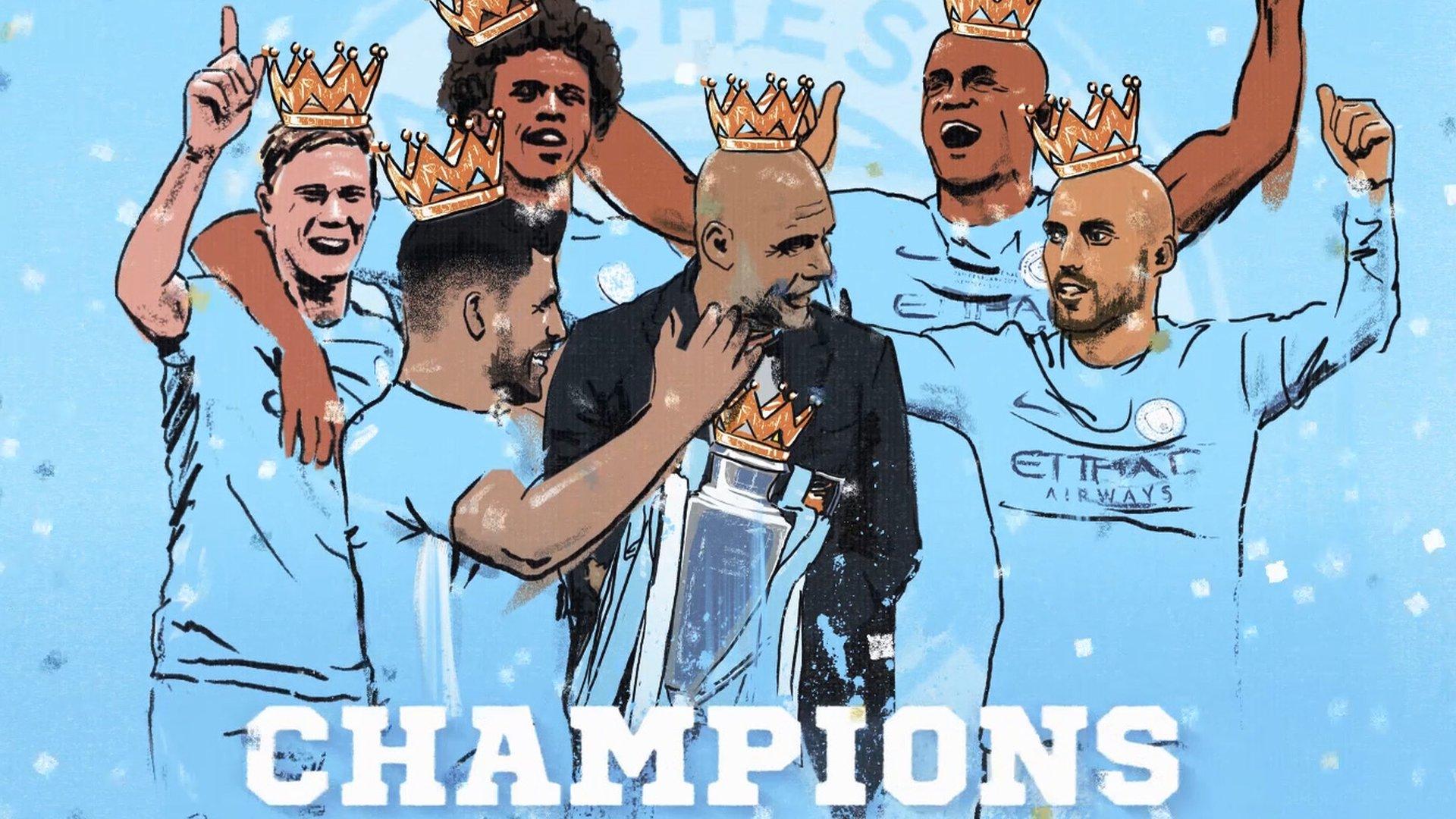Manchester City are Premier League champions: How Pep Guardiola did it
- Published
- comments
Manchester City: How Pep Guardiola's team wowed Match of the Day pundits
Manchester City's route to the Premier League title has been untouched by serious opposition - a coronation in the making since they went top of the table in September.
Manchester United's home defeat by West Brom on Sunday means Pep Guardiola's team have reached their target with only two league defeats, against Liverpool and Manchester United, and have not looked back since that 6-0 win against Watford at Vicarage Road put them top of the pile.
It has been an impressive feat of management by Guardiola to turn a 15-point deficit to deposed champions Chelsea last season into a runaway triumph.
Guardiola has been helped, of course, by Manchester City's spending power but it must not be ignored that rivals such as United, Chelsea and Liverpool have hardly had chequebooks that were gathering dust.
City and Guardiola suffered the pain of Champions League defeat as they lost convincingly 5-1 over two legs to Liverpool in the quarter-finals. Europe's elite competition is regarded as the Holy Grail by the club's hierarchy - but in a Premier League context they have been the untouchables.
All that remains is whether City can eclipse Manchester United's record Premier League-winning margin of 18 points over Arsenal in 1999-2000 to cap a spectacular title campaign.
So how has Guardiola transformed a first league season that was regarded as a relative disappointment into one of triumph the following year?
Guardiola learned lessons of tough first season
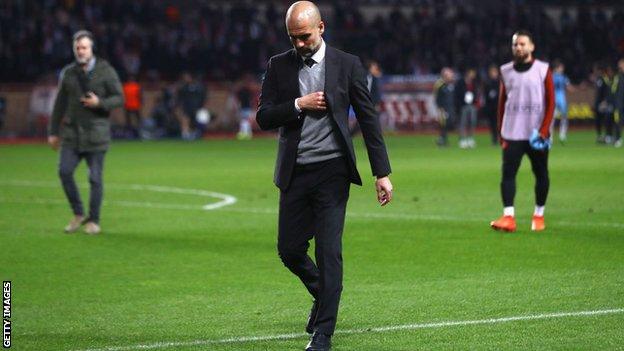
Manchester City lost to Monaco in the Champions League last 16 in Pep Guardiola's first season
When Pep Guardiola's appointment at Manchester City was confirmed on 1 February 2016 - shortly after Manuel Pellegrini announced his departure - it was the perfect fit for the ambitious plans plotted by the club's Abu Dhabi-based owners.
This was a house built and waiting for Guardiola to take occupancy. It was already home to City director of football Txiki Begiristain and chief executive Ferran Soriano, who worked hand in glove with Guardiola at Barcelona.
And yet even Guardiola, for all his Champions League and La Liga successes at Barcelona and his Bundesliga triumphs at Bayern Munich, was forced to learn lessons from a transitional first season that was a relative disappointment given the expectations that accompanied his arrival.
What initially looked like a relentless march to success after opening with six straight league wins stalled on several occasions and Guardiola was forced to accept the unaccustomed feeling of a season free from silverware.
City finished 15 points adrift of Premier League champions Chelsea, gave up a lead to lose an FA Cup semi-final against Arsenal and - arguably most disappointing of all - conceded a two-goal first-leg lead to go out against Monaco in the last 16 of the Champions League.
These were chastening moments, repeated again as they came up short against Liverpool in Europe, but, according to former Manchester City defender Danny Mills, their title success should not have come a surprise - nor should Guardiola's reshaping of his resources for this season's success, which also includes the Carabao Cup.
And even after that occasionally rocky first season there was certainly no panic or uncertainty at Manchester City as they accepted this was a period of relative upheaval with a squad that needed renewal. The club's faith in Guardiola to deliver what they desired never wavered.
Mills told BBC Sport: "I said all along Pep would get it right but that it would take him time. The Premier League is unlike any other league in the world with its sheer competitive nature that means bottom can beat top.
"If teams go 2-0 down they don't give up. They retain a belief they can win. The competition, even from game to game is fierce, and that is something you may not experience in other countries, even if you are coaching those elite clubs like Barcelona or Bayern Munich.
"Maybe he found the intensity a little bit surprising and also he didn't quite have the personnel right."
Mills added: "He probably grew to realise it was a little bit more competitive and challenging than he thought but people like Guardiola, Antonio Conte and Jose Mourinho are high-class managers, proven time after time.
"He hasn't got where he has without being a very good coach and manager and he made the big decisions and big changes to get City to where they are now. I did think it would take time but I knew he would get it right."
Guardiola's qualities as a coach are sometimes under-played and the possibility that it might have taken time to ingrain such a specific approach into his players should not be overlooked.
He is an advocate of religiously following a pattern of play until it is second nature to his players. It is designed to eliminate mistakes, positional errors and poor decision-making - and it is noticeable how Leroy Sane and Raheem Sterling, in particular, appear to have been the beneficiaries of this approach.
It is simple and complicated in turns, offering a level of understanding as to why Guardiola was not, and perhaps never going to be, an instant success.
So what were the other changes and developments that turned City into champions?
Bold and brave enough to replace Bravo
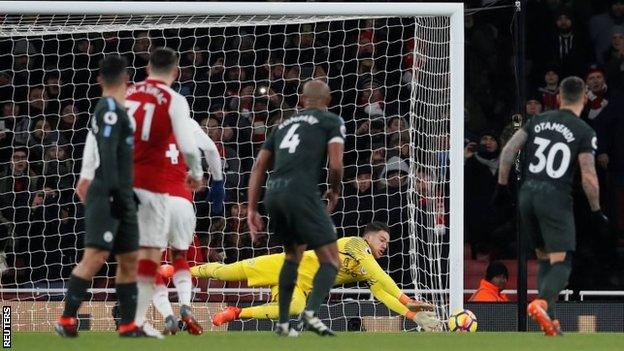
Manchester City have conceded fewer league goals than any other Premier League side this season
Guardiola's instant replacement of two-time title-winner, England goalkeeper and firm fan favourite Joe Hart was a bold and ruthless first statement of intent.
Hart's City career was over from the moment the Spaniard stepped through the doors of the Etihad Campus, an uncertain Euro 2016 seemingly confirming that he was surplus to the new manager's requirements.
It was a move that was not immediately a success as Guardiola turned to Chile international Claudio Bravo, signed for £15.4m from his former club Barcelona.
Bravo subsequently became the symbol of City's defensive struggles, a goalkeeper who was not as proficient with the ball at his feet as many assumed, even earning an unfortunate reputation as the shot-stopper who did not stop shots.
After the 2-2 draw against Tottenham at Etihad Stadium in January 2017 and the 4-0 loss at Everton the previous week, Bravo had conceded six goals from the last six shots he had faced. It also meant he had conceded 16 goals from the last 24 shots he had faced.
In 22 league games last season, he kept only five clean sheets and made 33 stops with a save ratio of 55.9%.
Guardiola, despite a continued loyalty to Bravo that ensured he played a crucial role in this season's EFL Cup win, decided he had to make the change.
In came Ederson from Benfica in a £35m deal and the 24-year-old Brazilian has been a resounding success, not only making crucial saves but giving City the extra attacking dimension Guardiola craves from his keepers with his calmness with the ball at his feet and the accuracy of his short and long-range distribution.
Burnley manager Sean Dyche said after City's 1-1 draw at Burnley: "It's like having [former Netherlands defensive great] Ronald Koeman in goal. He gets the ball and spins it around the pitch, all over the place, and that adds to City's game plan massively because he defuses the game.
"They give it back to him, he's nice and calm and then he'll clip one into midfield or clip it wide. There's not many keepers I know who can do that. It's a massive weapon for them."
Mills believes Guardiola's move to marginalise Bravo is another sign of his courage and willingness to alter strategy.
"He made decisions on what he thought was going to work, bearing in mind he'd never worked in this league at a close up level before, and some didn't quite work out," says Mills. "The change of goalkeeper is the perfect example.
"He was quite open by doing that. It was a massive decision and that takes a lot of bravery, holding your hands up and saying: 'You know what - I got it wrong.'
"He dropped England's number one, sent him out of the football club and brought in a goalkeeper in Claudio Bravo that didn't quite work.
"And rather than sticking with it to save face, he accepted it hadn't quite worked and he hadn't got that decision right and bang - changed. That is what top managers do. They don't mess about. They take the big decisions."
BBC Sport pundit Mark Lawrenson agreed the Ederson upgrade has been crucial.
"Distribution, shot-stopping, decision making - everything about him is a step up," said Lawrenson.
"Pep clearly identified areas where City had to improve. Goalkeeper was one of them and this is exactly what he did."
Guardiola freshened up City's flanks
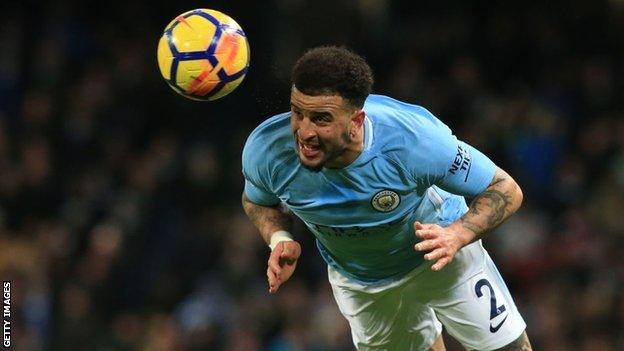
Kyle Walker has showed why Guardiola was so keen to sign him
Manchester City's uncharacteristically flawed succession planning left Guardiola inheriting a squad weakness it would take him a season to cure - namely a crucial, ageing area of his team.
Guardiola had quality defenders and fine servants at full-back in Pablo Zabaleta, Gael Clichy, Bacary Sagna and Aleksandar Kolarov, but all are well into their 30s and no longer capable of the energy and athleticism he requires in those positions.
Zabaleta, in particularly, has almost legendary status at City but the quartet left in summer 2017 as Guardiola continued his reshaping process.
England right-back Kyle Walker arrived from Tottenham in a £50m deal while 23-year-old Benjamin Mendy was bought from Champions League conquerors Monaco for £52m to take care of the left flank.
Mendy suffered a serious knee injury in September, meaning Guardiola often used Fabian Delph in that role instead, but City's defensive resources were also strengthened by the signing of Danilo from Real Madrid for £26.5m in July and Athletic Bilbao central defender Aymeric Laporte for a club record £57m in January.
Guardiola had acknowledged a weakness and attacked it with zeal to cure the problem. Three defeats against Liverpool, including in both legs of the Champions League last eight, and at home to Manchester United when City lost a 2-0 lead, suggest he still has work to do but this Etihad project is moving forward.
Mills believes the additions on the flanks were crucial, saying: "He replaced ageing full-backs who had been outstanding players for Manchester City. They have now got more energy going forward.
"They were great full-backs but they were not quite in the style Pep Guardiola wanted. In the past he has liked athletic full-backs that bomb forward. Now he has that again."
The rejuvenation of Raheem Sterling
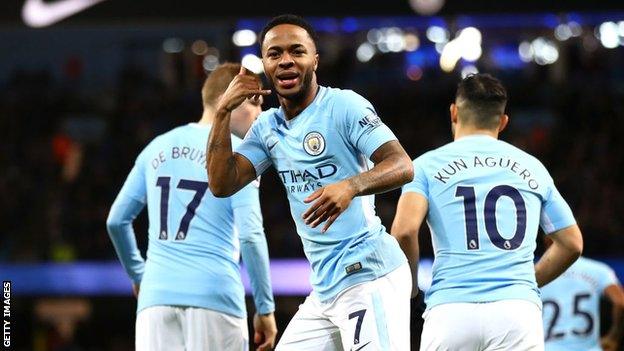
Raheem Sterling is enjoying the best season of his career
Guardiola's faith in Raheem Sterling has been unbreakable even in the darker moments - as he proved by texting him during his miserable Euro 2016 campaign with England in France to reassure him about the key role he would play in Manchester City's future.
Sterling took uncertain early steps at City following his £49m move from Liverpool in July 2015, with questions being asked about his failure to reproduce the sparkling form that almost took the title to Anfield in 2014.
And yet this season, under Guardiola's close tutelage, Sterling has answered the questions with the most consistent season of his career and most successful goals return. When Arsenal introduced his name into discussions about a potential deal for Alexis Sanchez in January, the prospect was dismissed immediately.
Sterling's previous best goal tally in the Premier League was nine from 33 games in 2013-14. Two seasons at City yielded only 13 goals from 64 games.
This season he had 15 league goals in the first 25 games. He had matched the previous best in eight league games and eclipsed it in 11 as he became a key component in Guardiola's attacking weaponry.
Sterling, understandably as he is still relatively young at 23, has the occasionally wayward day but his growing maturity is obvious.
Mills said: "This is about getting into the mentality of the player, getting into the player's head.
"Raheem Sterling has phenomenal ability and that has never really been in question. Has Pep improved that ability? Probably not in all honesty.
"Has he improved his confidence, game knowledge, tactical awareness? Of course he has and that is the biggest difference because that then embellishes all the natural ability.
"Raheem Sterling hasn't got a better touch because of Pep Guardiola. The way he strikes a ball isn't any better because of Pep Guardiola. His ability to select the right decision, to have the confidence and belief to put himself in the right position, to make the right run, these are things he has built.
"Game knowledge. Game management. Tactical awareness. All the things we don't actually coach that well in this country - that is what Pep Guardiola has improved in Sterling."
Guardiola has brought best from City's old guard
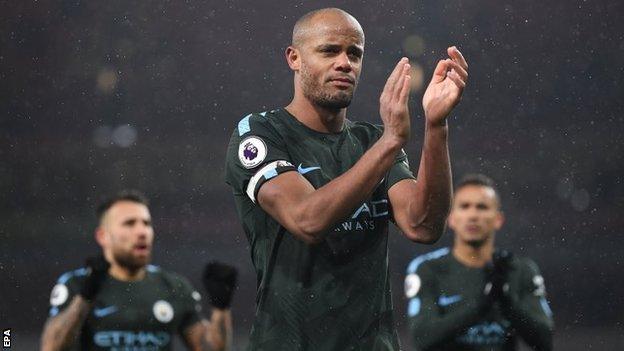
Vincent Kompany is back in the City mix after multiple injuries
Guardiola, as we have seen, has reshaped Manchester City and has them playing in his own image and likeness. He has not, however, changed for change's sake.
He has retained core members of the team that contribute to City's recent title successes and harnessed vibrant young attacking signings such as Leroy Sane and Gabriel Jesus alongside them.
Guardiola has also added another diminutive stylist in £42m Bernardo Silva - but battle-hardened veterans of City's previous successes remain at the club and team's heart.
David Silva and Sergio Aguero, signed by former manager Roberto Mancini in July 2010 and July 2011 respectively, have been outstanding contributors while captain Vincent Kompany - signed by Mark Hughes from Hamburg in August 2008 - has battled through a series of injury problems to demonstrate his inspirational qualities, especially when scoring in the EFL Cup final win over Arsenal at Wembley.
There were doubts expressed over Argentine Aguero's long-term City future but they have been banished as he has adapted to Guardiola's tireless work ethic while contributing his usual quota of goals.
It is has proved a potent cocktail of youth and experience, with Danny Mills saying: "You have got to keep older heads around.
"All top managers will tell you the older heads manage the dressing room, set the standards on things like turning up on time, all the little things people don't see behind the scenes - being professional, being on time, doing the right things, not being late for team meetings, wearing the right tracksuits, the right shirt and tie. And of course they make that significant contribution on the field.
"These are all things off the field that you might not think are important but when they build up and build up they create an ethos, a mentality.
"Kompany, Silva and Aguero have been there, seen it and done it. They are experienced and ultra-professional - not too dissimilar to the experienced players Chelsea and Manchester United had in recent years.
"They will take care of business in the dressing room. The manager doesn't have to say things half the time. Pep will know that and it is another sign of the quality of his management."
Guardiola uses spending and pulling power
Guardiola's personal charisma and virtual guarantee of success is a magnet to attract the biggest names - along with City's financial firepower.
And he has utilised both weapons wisely to bring the title back to Etihad Stadium.
Former Liverpool defender Lawrenson says: "Lots of clubs are interested in players but someone else pinches them.
"It doesn't happen to City very often does it? Dani Alves chose Paris St Germain and Alexis Sanchez ended up at Manchester United but other than that Pep has virtually got every player he seriously wanted.
"He wanted Walker, Ederson and Mendy and got them. Walker cost £50m and people questioned it - but he was the right-back he wanted and that was the price. Now you can see why he wanted Walker."
The result has been a Premier League title that has been achieved with wonderfully entertaining football and no serious threat from those hoping to be Manchester City's rivals.
- Published16 April 2018
- Published15 April 2018
